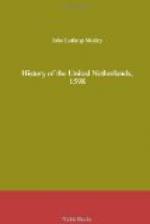Her Majesty then interrupted the speaker by violent invectives against the French king for his treachery. She had written with her own hand, she said, to tell him that she never had believed him capable of doing what secretaries and other servants had reported concerning him, but which had now proved true.
Then she became very abusive to the Dutch envoys, telling them that they were quite unjustifiable in not following Sir Robert Cecil’s advice, and in not engaging with him at once in peace negotiations; at least so far as to discover what the enemy’s intentions might be. She added, pettishly, that if Prince Maurice and other functionaries were left in the enjoyment of their offices, and if the Spaniards were sent out of the country, there seemed no reason why such terms should not be accepted.
Barneveld replied that such accommodation was of course impossible, unless they accepted their ancient sovereign as prince. Then came the eternal two points—obedience to God, which meant submission to the pope; and obedience to the king, that was to say, subjection to his despotic authority. Thus the Christian religion would be ruined throughout the provinces, and the whole land be made a bridge and a ladder for Spanish ambition.
The queen here broke forth into mighty oaths, interrupting the envoy’s discourse, protesting over and over again by the living God that she would not and could not give the States any further assistance; that she would leave them to their fate; that her aid rendered in their war had lasted much longer than the siege of Troy did, and swearing that she had been a fool to help them and the king of France as she had done, for it was nothing but evil passions that kept the States so obstinate.
The envoy endeavoured to soothe her, urging that as she had gained the reputation over the whole world of administering her affairs with admirable, yea with almost divine wisdom, she should now make use of that sagacity in the present very difficult matter. She ought to believe that it was not evil passion, nor ambition, nor obstinacy that prevented the States from joining in these negotiations, but the determination to maintain their national existence, the Christian religion, and their ancient liberties and laws. They did not pretend, he said, to be wiser than great monarch or their counsellors, but the difference between their form of government and a monarchy must be their excuse.
Monarchs, when they made treaties, remained masters, and could protect their realms and their subjects from danger. The States-General could not accept a prince without placing themselves under his absolute authority, and the Netherlanders would never subject themselves to their deadly enemy, whom they had long ago solemnly renounced.
Surely these remarks of the Advocate should have seemed entirely unanswerable. Surely there was no politician in Europe so ignorant as not to know that any treaty of peace between Philip and the States meant their unconditional subjugation and the complete abolition of the Protestant religion. Least of all did the Queen of England require information on this great matter of state. It was cruel trifling therefore, it was inhuman insolence on her part, to suggest anything like a return of the States to the dominion of Spain.




